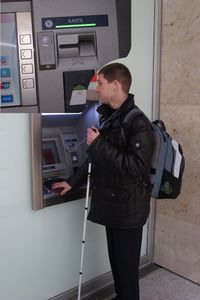Key:speech_input
| Description |
|---|
| Vending machine or similar device is able to use speech input to communicate with the human. |
| Group: accessibility |
| Used on these elements |
| Useful combination |
| Status: in use |
| Tools for this tag |
|
speech_input:xx=* is used to indicate when a vending machine or similar device is able to use speech input to communicate with the human. The two character suffix stands for the language, in which the machine can accept spoken words.
Description
![]() Speech_recognition, People with disabilities can benefit from speech recognition programs. For individuals that are Deaf or Hard of Hearing, speech recognition software is used to automatically generate a closed-captioning of conversations such as discussions in conference rooms, classroom lectures, and/or religious services.[1]
Speech_recognition, People with disabilities can benefit from speech recognition programs. For individuals that are Deaf or Hard of Hearing, speech recognition software is used to automatically generate a closed-captioning of conversations such as discussions in conference rooms, classroom lectures, and/or religious services.[1]
Speech recognition is also very useful for people who have difficulty using their hands, ranging from mild repetitive stress injuries to involved disabilities that preclude using conventional computer input devices. In fact, people who used the keyboard a lot and developed RSI became an urgent early market for speech recognition.[2][3] Speech recognition is used in deaf telephony, such as voicemail to text, relay services, and captioned telephone. Individuals with learning disabilities who have problems with thought-to-paper communication (essentially they think of an idea but it is processed incorrectly causing it to end up differently on paper) can possibly benefit from the software but the technology is not bug proof.[4] Also the whole idea of speak to text can be hard for intellectually disabled person's due to the fact that it is rare that anyone tries to learn the technology to teach the person with the disability.[5]
This type of technology can help those with dyslexia but other disabilities are still in question. The effectiveness of the product is the problem that is hindering it being effective. Although a kid may be able to say a word depending on how clear they say it the technology may think they are saying another word and input the wrong one. Giving them more work to fix, causing them to have to take more time with fixing the wrong word.[6]
Examples
- speech_input:en=yes+speech_input:de=yes The vending machine accepts speech input in English and German (de) languages.
Important
Not every device that uses speech input and output is automatically accessible for blind persons.
Useful combinations
Notes
- ↑ “News from”. MassMATCH. 2010-03-18. Retrieved 2013-06-15.
- ↑ “Speech recognition for disabled people”.
- ↑ Friends international support group
- ↑ Garrett, Jennifer Tumlin, et al. "Using Speech Recognition Software to Increase Writing Fluency for Individuals with Physical Disabilities." Journal of Special Education Technology 26.1 (2011): 25-41. Web.
- ↑ Forgrave, Karen E. "Assistive Technology: Empowering Students with Disabilities." Clearing House 75.3 (2002): 122-6. Web.
- ↑ Tang, K. W., Ridha Kamoua, and Victor Sutan. "Speech Recognition Technology for Disabilities Education." Journal of Educational Technology Systems 33.2 (2004): 173-84. Web.
